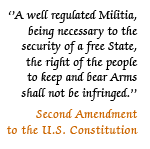D.C. Circuit Upholds Individual Right to Bear Arms

Good news for those who, like me, believe the Second Amendment confers an individual right to bear arms. The D.C. Circuit Court of Appeals today holds it does. The opinion is here.
Covering the decision extensively: How Appealing, Instapundit, Volokh Conspiracy and Cato.
As Volokh notes, this is not the first federal appeals court to rule this way. The 5th Circuit did in U.S. v. Emerson, which I wrote about here, when contrasting with the 10th Circuit position.
My bottom line on the issue hasn't changed since 2002 when I started TalkLeft:
Being for the Second Amendment doesn't mean defense lawyers are not liberals. It means they won't give up any constitutional right, even ones they may not exercise personally. Give 'em an inch and.....besides, the Second Amendment is only one away from the Fourth.
| < NY Firefighters Blast Rudy Giuliani | A Vietnam Vet Speaks on How We are Failing Our Returning Troops > |



